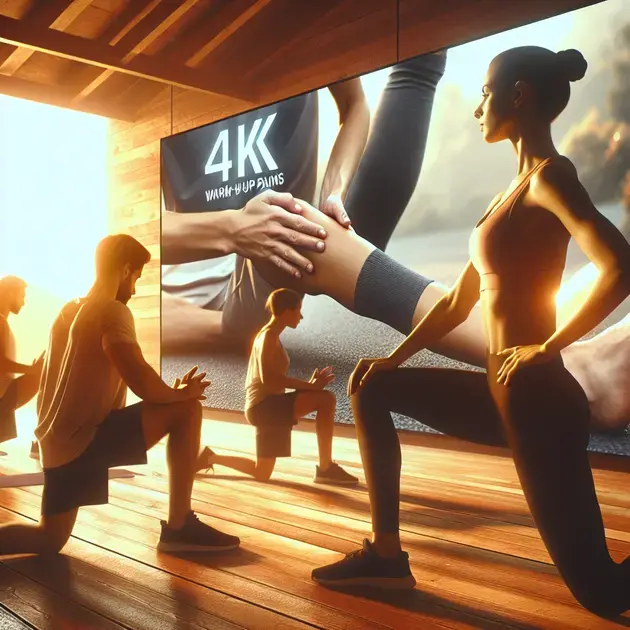Are you experiencing knee pain when walking? It can be a frustrating and limiting issue to deal with. In this post, we will share some valuable tips to relieve knee pain when walking and improve your overall mobility.
With the right strategies and techniques, you can alleviate discomfort and make walking a more comfortable and enjoyable experience. Let’s dive into the details and discover how you can enjoy pain-free walks once again.

Effective Techniques to Reduce Knee Pain While Walking
Walking is a great exercise, but for those experiencing knee pain, it can be challenging. Here are some effective techniques to help reduce knee pain while walking:
1. Proper Footwear:
Invest in a good pair of walking shoes with proper cushioning and support. Brands like Nike and New Balance offer shoes specifically designed for walking that can help reduce knee pain. You can find these shoes online on the official websites of the brands or on popular e-commerce platforms like Amazon.
2. Warm-Up Exercises:
Before starting your walk, perform some gentle warm-up exercises to loosen up your muscles and joints. Apps like ‘MyFitnessPal’ provide warm-up routines for walkers that you can follow to prepare your body for the exercise.
3. Proper Stretching:
Stretching your leg muscles, especially your quadriceps and hamstrings, can help reduce strain on your knees while walking. YouTube channels like ‘FitnessBlender’ offer guided stretching routines for walkers that you can follow along with.
4. Maintain Good Posture:
Keep your back straight, shoulders back, and head held high while walking. Maintaining good posture can help align your body properly and reduce the stress on your knees. Websites like ‘Verywell Fit’ provide tips on how to improve your walking posture.
5. Cool Down:
After your walk, don’t forget to cool down with some gentle stretches. Apps like ‘Calm’ offer cool-down routines that can help relax your muscles and prevent post-walk knee pain.
Simple Exercises to Strengthen Your Knees and Alleviate Pain
To strengthen your knees and alleviate pain, incorporating simple exercises into your routine can be highly beneficial. Here are some exercises you can try:
1. Quad Sets:
Start by sitting on the floor with your legs extended. Tighten the muscles on the top of your thigh and hold for a few seconds. Repeat this exercise for 10-15 repetitions. Websites like ‘PhysicalTherapyExercises’ provide detailed instructions on how to perform quad sets correctly.
2. Straight Leg Raises:
Lie down on your back with one leg bent and the other extended. Lift the straight leg to the height of the bent knee and hold for a few seconds before lowering it back down. Repeat for 10-15 repetitions on each leg. You can find video tutorials for straight leg raises on platforms like ‘Physiotutors’.
3. Hamstring Curls:
Stand behind a chair and hold onto it for support. Slowly bend one knee and bring your heel towards your buttocks, feeling the contraction in your hamstring. Perform 10-15 repetitions on each leg. Apps like ‘FitOn’ offer guided hamstring curl exercises for users.
4. Step-Ups:
Using a sturdy bench or step, step one foot onto the platform and push through that heel to lift your body up. Step down and repeat with the other leg. Aim for 10-15 step-ups on each side. Platforms like ‘DailyBurn’ provide step-up workout routines for all fitness levels.
5. Calf Raises:
Stand with your feet hip-width apart and slowly raise your heels off the ground, lifting your body onto the balls of your feet. Lower down and repeat for 10-15 repetitions. Websites like ‘Healthline’ offer tips on how to perform calf raises effectively.
Tips for Proper Walking Form to Minimize Knee Discomfort
Proper walking form is essential to minimize knee discomfort and prevent injuries. Here are some tips to help you maintain the correct form while walking:
1. Foot Placement:
Make sure to land on your heel and roll through to your toes with each step. Avoid striking the ground with your toes first, as this can increase the impact on your knees. Websites like ‘Runner’s World’ provide guidance on proper foot placement techniques.
2. Stride Length:
Maintain a comfortable stride length that allows your legs to move naturally. Overstriding or taking too short of steps can both lead to knee pain. Apps like ‘MapMyWalk’ offer features that track your stride length and provide feedback on optimizing it.
3. Arm Swing:
Keep your arms at a 90-degree angle and swing them naturally as you walk. Your arms help to balance your body and reduce the strain on your knees. YouTube channels like ‘Fitness Walking with Leslie Sansone’ offer tutorials on proper arm swing techniques.
4. Core Engagement:
Engage your core muscles by pulling your belly button towards your spine while walking. A strong core provides stability and support for your body, reducing the burden on your knees. Websites like ‘Verywell Fit’ offer tips on how to engage your core while walking.
5. Relax and Breathe:
Relax your shoulders, neck, and jaw while walking to avoid tension that can affect your gait. Focus on your breathing, taking deep inhales and exhales to stay relaxed and oxygenate your muscles. Meditation apps like ‘Headspace’ provide breathing exercises that you can incorporate into your walking routine.

**Incorporating Stretching and Warm-Up Routines for Knee Pain Relief**
Introduction
Stretching and warming up before engaging in physical activities can play a crucial role in preventing knee pain and injuries. By incorporating specific routines into your pre-walk preparations, you can effectively alleviate discomfort and promote joint health.
Step-by-Step Guide
1. Start by performing gentle knee stretches such as quad stretches, hamstring stretches, and calf stretches. Hold each stretch for 15-30 seconds to improve flexibility and mobility in the knee joint.
2. Follow up with dynamic warm-up exercises like leg swings, high knees, and butt kicks to increase blood flow to the knees and prepare the muscles for walking.
3. Consider incorporating yoga poses like downward dog, pigeon pose, and child’s pose to further enhance the flexibility and strength of the knee muscles.
4. Finish your warm-up routine with light cardio exercises such as brisk walking or cycling for 5-10 minutes to elevate your heart rate and fully prepare your body for the walk.
5. Remember to listen to your body during the warm-up process and adjust the intensity of the exercises based on your comfort level and mobility.
Implementing Supportive Footwear Choices for Walking Comfort
Utilizing Ice and Heat Therapy for Managing Knee Pain During Walks
**
Conclusion
**
Incorporating stretching and warm-up routines into your pre-walk preparations is paramount for preventing knee pain and injuries. By following a step-by-step guide that includes gentle knee stretches, dynamic warm-up exercises, and yoga poses, you can enhance flexibility and strength in the knee muscles, promoting joint health and alleviating discomfort.
The importance of listening to your body during the warm-up process cannot be overstated. Adjusting the intensity of exercises based on comfort level and mobility is crucial in avoiding strain and injury. Additionally, finishing the warm-up routine with light cardio activities like brisk walking or cycling helps elevate the heart rate and fully prepares the body for the walk ahead.
Moreover, implementing supportive footwear choices and utilizing ice and heat therapy can further enhance walking comfort and manage knee pain effectively. By paying attention to these aspects, you can ensure a more enjoyable and pain-free walking experience, promoting overall well-being and joint care.